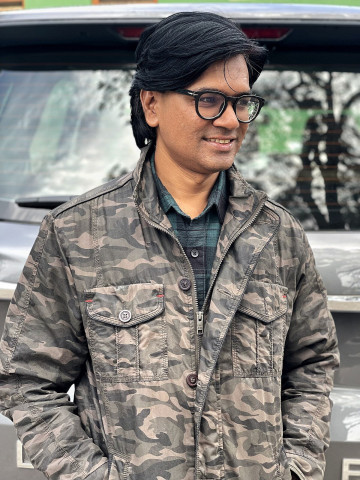Indian Journalist faces sedition charges for exposing anti-Muslim remarks by Hindu priest
UP police seeking Mohammed Zubair's arrest over accusations of endangering sovereignty, unity, and integrity of India

More than two years after the Supreme Court granted bail and ordered the “immediate release” of journalist Mohammed Zubair, the co-founder of AltNews, he is once again in court facing serious charges.
On Tuesday, the Allahabad High Court briefly heard a fresh petition filed by Zubair, as police in Uttar Pradesh seek his arrest over accusations of “endangering the sovereignty, unity, and integrity of India.”
The charge, which is non-bailable, carries the potential for a minimum sentence of seven years in prison, a fine, or even life imprisonment. Zubair, 41, denies the allegations, maintaining that he is being targeted for his work. “I feel I’m being targeted because of the work I do,” he told the BBC.
The case stems from a post Zubair shared on X (formerly Twitter) on October 3, which spotlighted a video of a controversial Hindu priest, Yati Narsinghanand, making inflammatory remarks against Prophet Muhammad.
The video sparked protests by Muslims outside Narsinghanand’s Dasna Devi temple in Ghaziabad, Uttar Pradesh. The priest, notorious for his anti-Muslim rhetoric, had previously been jailed in 2022 for making similar Islamophobic remarks.
Zubair’s post, which exposed the priest’s comments, led to a complaint lodged by Uditya Tyagi, a politician affiliated with India’s ruling Bharatiya Janata Party (BJP). In his initial complaint, Tyagi accused Zubair of promoting religious enmity, defamation, and providing false evidence.
However, last week, police added a far more serious charge under Section 152 of India’s new criminal code, alleging that Zubair’s actions “endangered the sovereignty, unity, and integrity” of the country.
This legal development has raised alarm among rights groups, journalists, and legal experts. Section 152 is seen as a particularly harsh provision, reminiscent of colonial-era sedition laws, and critics argue that it is being used to silence dissenting voices.
Amnesty International India condemned the move, saying the case was part of a broader trend of harassing journalists and activists for peacefully exercising their right to free expression.
“It’s a classic case of shooting the messenger. It’s a witch-hunt,” said Pratik Sinha, Zubair’s colleague and fellow co-founder of AltNews.
Zubair’s supporters argue that he is being persecuted for his critical reporting on hate crimes and the government’s actions. Zubair himself pointed out that many others, including journalists and political figures, had shared the same video of Narsinghanand’s speech, yet he was being singled out.
The Press Club of India also condemned the charges, describing them as an “unfounded” and “vindictive” overreach by state authorities. “This has the potential to silence free thinkers and media,” it stated in a statement.
Zubair, who had previously spent over three weeks in jail in 2022 after being arrested over a tweet that criticised the BJP’s Nupur Sharma, remains steadfast in his defence. His legal team has sought interim bail and requested that the charges be dismissed.
This latest development comes amid mounting concerns over press freedom in India, which has seen a decline in global rankings. India now ranks 159th out of 180 countries in the 2023 World Press Freedom Index published by Reporters Without Borders, down from 140th in 2022.
Zubair’s case is the latest in a series of high-profile legal challenges faced by journalists in India. Critics argue that the government is using the legal system to target independent media, while Zubair and his supporters remain committed to holding authorities to account.
“Journalists critical of the government are routinely subjected to harassment, threats, and arrests,” said a spokesperson for Reporters Without Borders. “Zubair’s case is a worrying example of this trend.”



















COMMENTS
Comments are moderated and generally will be posted if they are on-topic and not abusive.
For more information, please see our Comments FAQ